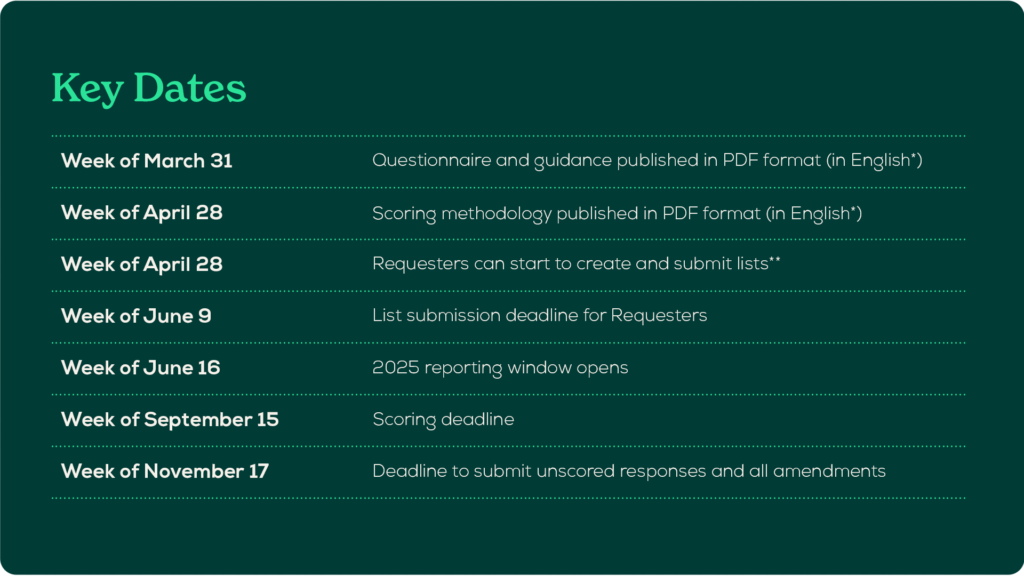The CDP (Carbon Disclosure Project) is one of the leading platforms for companies to disclose critical environmental data, providing a standardised, credible framework for assessing and communicating sustainability performance. ‘Performance’ is the key word here as CDP provides reporting companies with a score which responds to increasing pressures for transparency while providing valuable benchmarking opportunities.
The strengths of CDP as an ESG disclosure platform
CDP serves as a crucial tool for organisations looking to report on their environmental impact. One of the platform’s key strengths is its comprehensive and structured approach to data collection. Clear guidance is provided to help companies collect and report on specific data points required as part of their disclosures. This standardisation ensures that disclosures are consistent, transparent, and comparable across sectors and regions, which is essential for investors, regulators, and other stakeholders seeking reliable ESG information.
Moreover, CDP’s reporting framework allows companies to benchmark their performance against peers in their sector, providing valuable insights into where they stand in relation to industry leaders and laggards. This peer comparison encourages continuous improvement and innovation in sustainability practices, driving companies to adopt more ambitious targets and strategies.
Another notable benefit of CDP is the platform’s global reach and alignment with other widely recognised ESG frameworks, including the Task Force on Climate-related Financial Disclosures (TCFD), the Global Reporting Initiative (GRI), and the Sustainable Development Goals (SDGs). Interoperability between frameworks builds cohesion for companies collecting data for various reporting cycles, making the process more streamlined and easier to adopt.
Key changes to the 2025 CDP reporting questionnaire
CDP amend the questionnaires on a yearly basis to ensure relevance; introducing new modules (biodiversity and plastics being the latest additions), adding new questions and modifying others. Last year saw a notable upheaval in the consolidation of all three questionnaires (climate change, water and forests) into one.
For 2025 reporting, further changes have been integrated to reflect the increasing demand for robust sustainability data.
- Expanded climate risk disclosure: CDP has released modified questions and guidance for companies reporting information on climate risk. Companies will be asked to assess and disclose how they are addressing both the physical impacts of climate change, such as extreme weather events and supply chain disruptions, as well as the financial risks related to transitioning to a low-carbon economy, including the regulatory landscape and market shifts.
- Enhanced Scope 3 emissions reporting: The 2025 questionnaire will place a greater emphasis on Scope 3 emissions—those indirect emissions resulting from a company’s supply chain and product lifecycle. As Scope 3 emissions often represent the largest share of a company’s total carbon footprint, CDP now requires more detailed reporting on how companies assess and reduce these emissions, with specific prompts on data collection processes, engagement with suppliers, and strategies to reduce emissions in the value chain.
- Water security metrics: Water-related risks are becoming increasingly critical for businesses, especially in water-scarce regions. For 2025, CDP is enhancing its water security questionnaire via modified guidance on water management.
- Integration with the EU Taxonomy: As the EU continues to strengthen its sustainable finance regulations, CDP will include modifications to the CDP questionnaire aligned with the EU Taxonomy for sustainable activities. Companies must report how their activities contribute to environmental objectives, such as climate change mitigation and adaptation, pollution prevention, and biodiversity protection.
These changes reflect an ongoing evolution towards greater accountability, transparency, and alignment with international standards, ensuring that CDP continues to provide a relevant and reliable platform for ESG disclosure in 2025 and beyond.

*Translated versions of the questionnaire and guidance PDF and the scoring methodology PDF will be made available in May (in Chinese, Japanese, Brazilian, Portuguese, and Spanish).
**Requesters who can create and submit lists include Supply Chain Members, Private Markets, and Corporate Banking Members.
At Positive Planet, we help businesses navigate ESG requirements with tailored solutions, ensuring compliance and commercial value through assessments, reporting, and strategy development. Our hands-on approach identifies ESG risks, supports data collection, and delivers clear, actionable reports, whether for compliance, assurance, or policy development.

